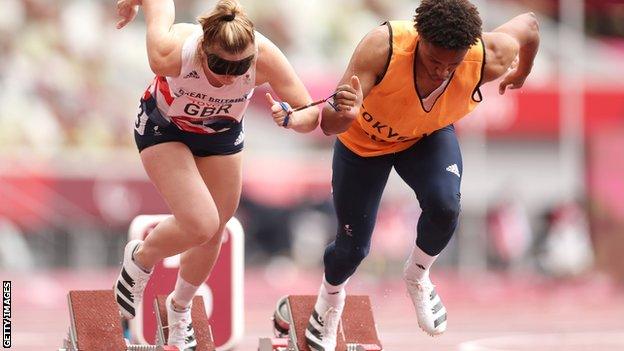Tanni Grey-Thompson column: 'Great moments in Tokyo but Para-sport faces challenges'
- Published

Baroness Grey-Thompson, who won 11 Paralympic gold medals for Great Britain and competed at every summer Games from 1988 to 2004, was part of the BBC Radio 5 Live team in Tokyo.
As the Paralympic flame is extinguished in Tokyo, back in the United Kingdom, the number crunching will have already begun.
In terms of medals, the ParalympicsGB team have surpassed the London 2012 total of 120 but the number of golds won - 41 - is down compared with Rio, where 64 were brought home. With 124 medals, they sit comfortably within the medal target range that was given at the start of the Games of between 100 and 140.
Each sport will now be looking at the medals they won against what was expected, as well as how they convert lower places up to podium positions for next time.
This time, Great Britain have won medals in more sports - 18 - than ever before and it shows there is depth across the team.
The medal table and the number of golds won determines where the team finishes but there is always more to it than that. Personal bests also have some sway.
Paris 2024 will be coming up quickly. The year after a Games is normally one for rebuilding but that changes with the next summer Games only three years away.
What we saw in Japan were some great moments of sport and also some heartache. The mixed zone interview is at times joyous and brutal, enlightening and voyeuristic.
Swimmer Ellie Robinson's considered thoughts on her own experiences were all four. The athlete voice is something that has been talked about for many years. Not every athlete wants or can use their platform but at this Games, with the pandemic, it seems that there is a lot more than the usual question of "Are you happy you won or sad you lost?"
I am proud and happy to tell my story - Robinson
We have had much better access to families during the Games because of online connections. Previously we would have had little access to travelling families and virtually none to those who stayed at home.
What is also different is that as media we have had very limited access to the city because of quarantine regulations. NHK, the Japanese broadcaster, has made a big commitment and the Games were shown in more countries around the world than ever before. But without seeing spectators flocking to venues, we didn't get a feel for how the Games were received by the Japanese public.
I thought I might miss the fans but it has just been the norm because every day is the same. However, I did miss being able to mix with athletes and coaches to pick up those extra little bits of information.
It was hard to imagine before we arrived how it was going to work in terms of Covid-19 testing but if they did it for the Olympics, they could do it for us. There were pages of forms and apps to update, daily temperature checks and certificates to print. Once we were here, it felt like the price worth paying for being in Tokyo. I felt protected and safe the whole time.
It's a positive that there were more women competing here than ever before - twice the number than at Sydney 2000. But Para-sport does faces challenges, both at elite and grass-roots level.
Speaking to BBC Radio 5 Live, British sprinter Richard Whitehead raised an interesting point about how events get and remain on the Paralympics programme. There are undoubtedly events that are stronger than others, but that is true of all sport. In reality, if an event is not on the programme, countries are unlikely to invest in development.
To be successful across a breadth of sport then, there needs to be participation and competition opportunities for those who don't right now have a Paralympic pathway, but might do in the future.
And disabled people should be able to enjoy playing sport regardless of how good they are at it - rather than only thinking in terms of the Paralympics.
We have seen new British names coming through here, such as Reece Dunn, Jaco van Gass, Dan Pembroke and Georgia Wilson. Daniel Sidbury, who debuted in Tokyo, has learned a lot and is the future of wheelchair racing.
It is hard to hear that athletes such as Libby Clegg, Ellie Simmonds and Jordanne Whiley have made their last Paralympic appearance, while David Weir is going to consider his options when he gets home.

Two-time Paralympic champion Libby Clegg has announced her retirement from athletics
These Games have seen a change in attitude to Para-athlete funding globally. While athletes in the UK benefit from the National Lottery, the USA recently announced equal prize money for Olympic and Paralympic athletes. Australia is talking about doing the same and in Thailand, it seems to be around £150,000 per gold, which could explain why their wheelchair racers are focusing more on the track - where they can do multiple races - than on the road.
It feels weird to be sitting here in Tokyo talking about the Winter Paralympics taking place in Beijing in March. It doesn't feel as if there is going to be much of a break. The planning cycle is very unusual but it might be the moment to build on the positive responses to these Games.
Whether Paris will be a return to normal, I don't know. I hope for the athletes who might be competing at their last Games in 2024, that it is. For the debutants from this Games, there is much to look forward to.